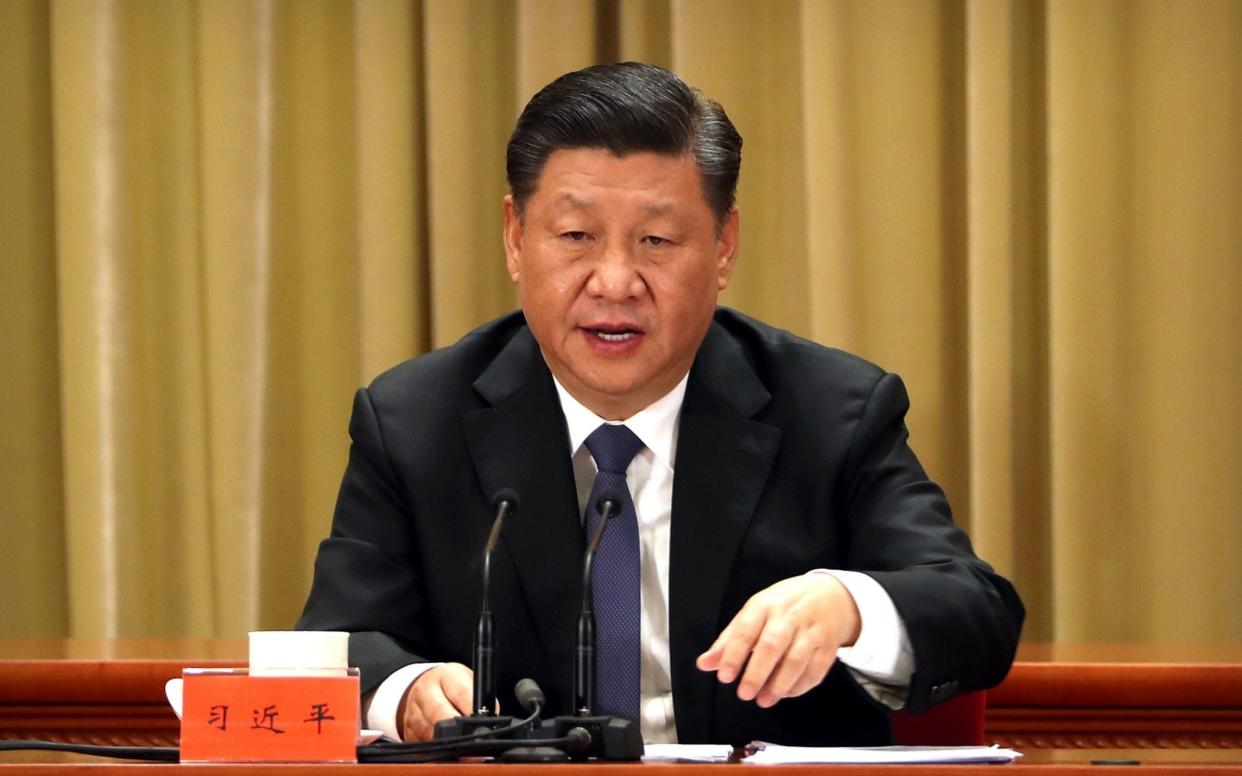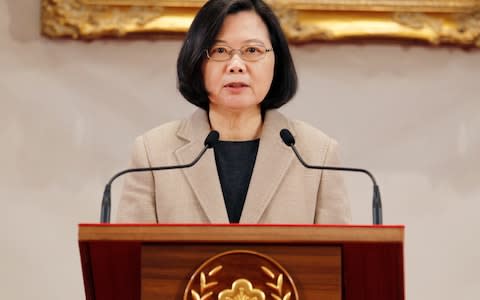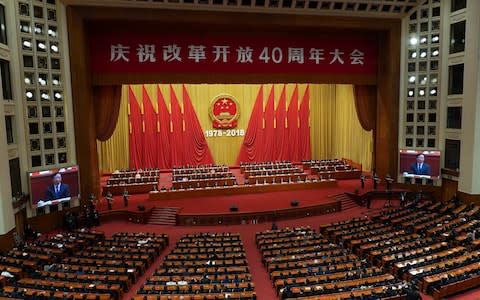China's Xi Jinping says Taiwan 'must and will be united' with Beijing

Beijing will not rule out the use of force to ensure the “unshakable historic task” of its complete reunification with Taiwan, Xi Jinping, the Chinese President, said on Wednesday, warning that independence for the island would bring “profound disaster.”
“China must and will be united, which is an inevitable requirement for the historical rejuvenation of the Chinese nation in the new era,” President Xi told a gathering at Beijing’s Great Hall of the People, to mark the 40th anniversary of a key Beijing policy statement when it sought to improve ties with Taipei.
“China won’t attack Chinese people. We are willing to use the greatest sincerity and expend the greatest hard work to strive for the prospect of peaceful reunification,” Mr Xi said.
But he added: “We do not promise to renounce the use of force and reserve the option to use all necessary measures” to achieve this goal and prevent Taiwan independence.
The threat was aimed at foreign forces seeking to interfere and advocates of Taiwanese independence, the president said, in what has been perceived to be a reference to the United States, Taiwan’s strongest backer. "No one and no party can change the fact that Taiwan is part of China," he said.
Mr Xi sought to reassure the Taiwanese that "peaceful reunification" would bring them "good and prosperous lives", even though the majority would prefer to have good relations with China without being ruled by Beijing.
The Chinese leader also urged young Taiwanese to look into the mainland for economic opportunities, in an appeal bound to trouble Taipei, which has long accused Beijing of fueling a brain drain of its best talent.

Responding to Mr Xi's remarks, Tsai Ing-wen, the Taiwanese president, said "we are willing to sit down and talk" but only if Taiwan was represented by its own government. She also rejected the concept of "one country, two systems" favoured by China.
Ms Tsai had already preempted President Xi’s address with her own speech on Tuesday, in which she emphasised Taiwan’s commitment to democracy and called on Beijing to seek peaceful means to solve their differences.
Taiwan rejects China’s territorial claims. As a result, Beijing has tried in recent years to undermine Taiwanese sovereignty and has stepped up pressure on the international community to exclude Taipei from global forums.
Meanwhile, Taiwan operates like any other democratic nation with its own government, currency, military and foreign policy and the majority of citizens identify as Taiwanese.
President Tsai, who Beijing has regarded with suspicion since her election in 2016, issued her own strongly-worded messages to China on Tuesday, accusing the Chinese of taking advantage of Taiwan’s openness and of threatening its national security.
“What the two sides of the strait really need is a pragmatic understanding of the fundamental differences in the values we espouse, our lifestyles, and our political systems,” she said.

"I am calling on China that it must face the reality of the existence of the Republic of China (Taiwan); it must respect the commitment of the 23 million people of Taiwan to freedom and democracy; it must handle cross-strait differences peacefully, on a basis of equality,” she said.
Chinese Nationalist forces fled to Taiwan in December of 1949 after losing a civil war to the Communists.
Since then the two sides have enjoyed close business, cultural and personal links while Taiwan has increasingly asserted its own identity and rejected the prospect of rule from Beijing.
Victor Gao, a commentator on China’s state broadcaster, said the “landmark speech” could be seen as a major turning point in cross-strait relations, leading to the start of political dialogue about a peaceful unification.
“We will see how this process unfolds in the coming months and years, to create miracles for both sides of the straits,” he said.
However, President Xi’s stern overtures received a muted response in Taiwan, where the population has become accustomed to threats from Beijing.
As president of the Republic of China, I must stress that we’ve never accepted the “1992 Consensus,” & the “four musts” are crucial for positive cross-strait developments. I call on #China to bravely take steps towards democracy, so they can truly understand the people of #Taiwanpic.twitter.com/Wvgiy44Oc8
— 蔡英文 Tsai Ing-wen (@iingwen) January 2, 2019
“The level of interest in Taiwan about this speech is indicative,” pointed out Samson Ellis, the Bloomberg chief in Taipei on his Twitter account.
“Only one news channel took it live, no sign of it on Yahoo news or Liberty Times, and on Apple Daily and UDN websites, it's below stories on the argument between Cabinet & Kaohsiung on promoting tourism to the city.”
Meanwhile, China's military is to strengthen its training and preparation for war, its official newspaper said on Tuesday.
"Drilling soldiers and war preparations are the fundamental jobs and work focus of our military, and at no time should we allow any slack in these areas," wrote the PLA Daily, later translated by the South China Morning Post.
"We should be well prepared for all directions of military struggle and comprehensively improve troops' combat rseponse in emergencies...to ensure we can meet the challenge and win when there is a situation.
